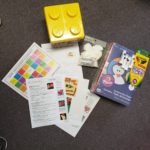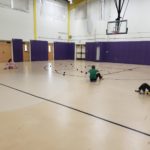Imagine finding new ways to entertain a few dozen kids between the ages of 5 and 13, every single day.
Now imagine doing it during a global pandemic that has reduced their school hours, cut off most of their in-person contacts, and tested the very limits of their patience.
That’s Trisha Ey’s job these days at St. Vincent’s Villa, Catholic Charities’ residential treatment facility for children facing significant emotional and behavioral challenges.
Ey, the therapeutic recreation coordinator at St. Vincent’s Villa, typically plans large events – a fair that brings together St. Vincent’s Villa and the nearby Villa Maria School, or an annual gathering that allows NFL athletes to spend time playing and talking with St. Vincent’s Villa kids.
But after the COVID-19 crisis thwarted major events, Ey and some of her colleagues turned their attention to the everyday. The activities they suggest are designed not only to entertain the children, but also to promote fine motor skills and the kind of social-interaction skills that many residents lack.
- The craft activities have an added benefit: they help the young residents develop motor skills.
- Exercise, fun, and social distance all in one activity!
- Pine cone art
“We’re bringing old-school games back,” Ey said, mentioning kickball, dodgeball, sharks and minnows, sidewalk-chalk obstacle courses, balloon-powered Lego cars, and pine cone bird feeders as a few of the activities suggested in recent weeks. She and her colleagues find ways to adapt the games and crafts to the different ages and abilities, and to get staff members involved.
“Yesterday, we held scooter relay races in the gym, so we took the four oldest and told them they were the team captains,” she said. “When you work with the kids at St. Vincent’s Villa, they don’t always know teamwork. They only know how to fend for themselves or do for themselves. When you put them in a situation where you have to cheer each other on, it’s good.”
St. Vincent’s Villa suspended visits and volunteer activities at the residential facility as the pandemic spread. Staff have implemented new practices to promote a safe and healthy environment, including scheduling hand washings into the daily routine, limiting interactions between the residential units of children, and taking each child’s temperature twice daily. But the children still have access to a playground, gym, bikes, and the vast green space of the Baltimore County campus.
In this respect, “the kids here are in a better position than some families are,” Ey said. “It’s a matter of really showing them how much they can be grateful for and appreciate.”
A parent of a 4-year-old and a 6-year-old, Ey said she finds inspirations for activities at home, from pre-school activities, a PTA listserv, or Pinterest. And she has been happy to share her daily email with colleagues and friends, recognizing the activities may help all children cooped up by the novel coronavirus.
“My parents kept me very busy when I was a kid, and I loved it,” she said. “Even with my kids, the more I keep them busy, the fewer problems we have!”



